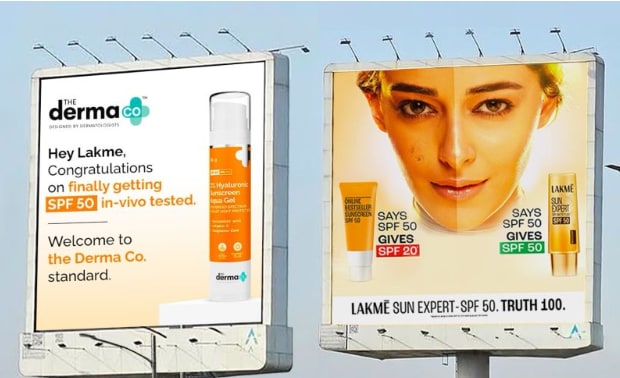We’ve seen Cola Wars, but the beauty industry may now be witnessing its first Sunscreen Skirmish. What began as a product campaign quickly turned into a public exchange between legacy powerhouse Lakmé and new-age disruptor Honasa Consumer, the parent company behind Mamaearth and The Derma Co. At the center of the clash: SPF 50 sunscreen, clinical transparency, and the race to win the trust of increasingly discerning Indian consumers.
As the skincare market continues to evolve amid growing consumer demand for efficacy and accountability, this recent exchange between two major players – one legacy, one insurgent – has brought sunscreen to the forefront of a larger conversation about industry standards.
Ghazal Alagh, co-founder and chief innovation officer at Honasa Consumer, publicly welcomed HUL-owned Lakmé into what she called the “SPF 50 club” following Lakmé’s high-decibel campaign for a sunscreen product boasting high-efficacy claims. Alagh, whose company owns Mamaearth and The Derma Co., has long championed clinical transparency and in-vivo testing as benchmarks in the personal care space.
Her LinkedIn post showed a nearby billboard from The Derma Co., placed directly beside Lakmé’s, declaring: ‘Welcome to the standard.’ The carefully choreographed display conveyed competitiveness and a race toward greater scientific validation.
“Good competition is always great for any market,” Alagh wrote. “It keeps brands from becoming sleepy, lethargic & brings more innovation for the consumers. Lakmé, welcome to the in-vivo tested SPF 50 club, finally! I’m so glad to see more awareness building around this because sunscreen is one of the most important steps in skincare.”
Yet the conversation does not end with social media jabs or out-of-home advertising. Lakmé’s new campaign, tied to its Sun Expert SPF 50 launch, is taking a more structured approach to consumer education. Rolling out across Instagram, YouTube, and various OTT platforms, the initiative seeks to empower Indian consumers to make informed decisions when buying sunscreen, particularly in a market where regulatory standards remain inconsistent.
Central to the campaign is an in-vivo test conducted at an independent clinical research lab, designed to validate Lakmé’s core claim: “When Lakmē Sun Expert SPF 50 claims SPF 50, it delivers SPF 50.” The company points to widespread industry practices in which multiple products claim SPF 50 and PA++++ ratings without substantiating those promises through rigorous testing. In some cases, products marketed as SPF 50 have delivered as little as SPF 20 in independent evaluations.
“Lack of mandatory regulations on sunscreen testing enables multiple brands to claim SPF 50 & PA++++,” said Harman Dhillon, Executive Director and General Manager, Beauty and Wellbeing at Hindustan Unilever Limited, which owns Lakmé. “We are shedding light on the disparity between the exaggerated SPF claims and actual sun protection delivered across multiple such products.”
Dhillon emphasized that Lakmé’s latest initiative is not just about product differentiation but aims to catalyze a broader transformation in the category. “At Lakmē, our mission extends far beyond sun protection,” she said. “We’re committed to transforming the sunscreen industry through unwavering transparency, scientific validation, and consumer awareness.”
Alagh, meanwhile, suggested that such moves, while welcome, have been a long time coming. She has previously criticized traditional brands for what she describes as “blatant” replication of newer players’ product formulations and packaging, arguing that the absence of robust competition allowed complacency to take root.
Still, she sees this shift as a net positive. “We did it with Mamaearth in making brands move towards clean-label ingredients,” Alagh said. “And now again with The Derma Co., which is showing the way around honest active disclosures and claims based on science.”
